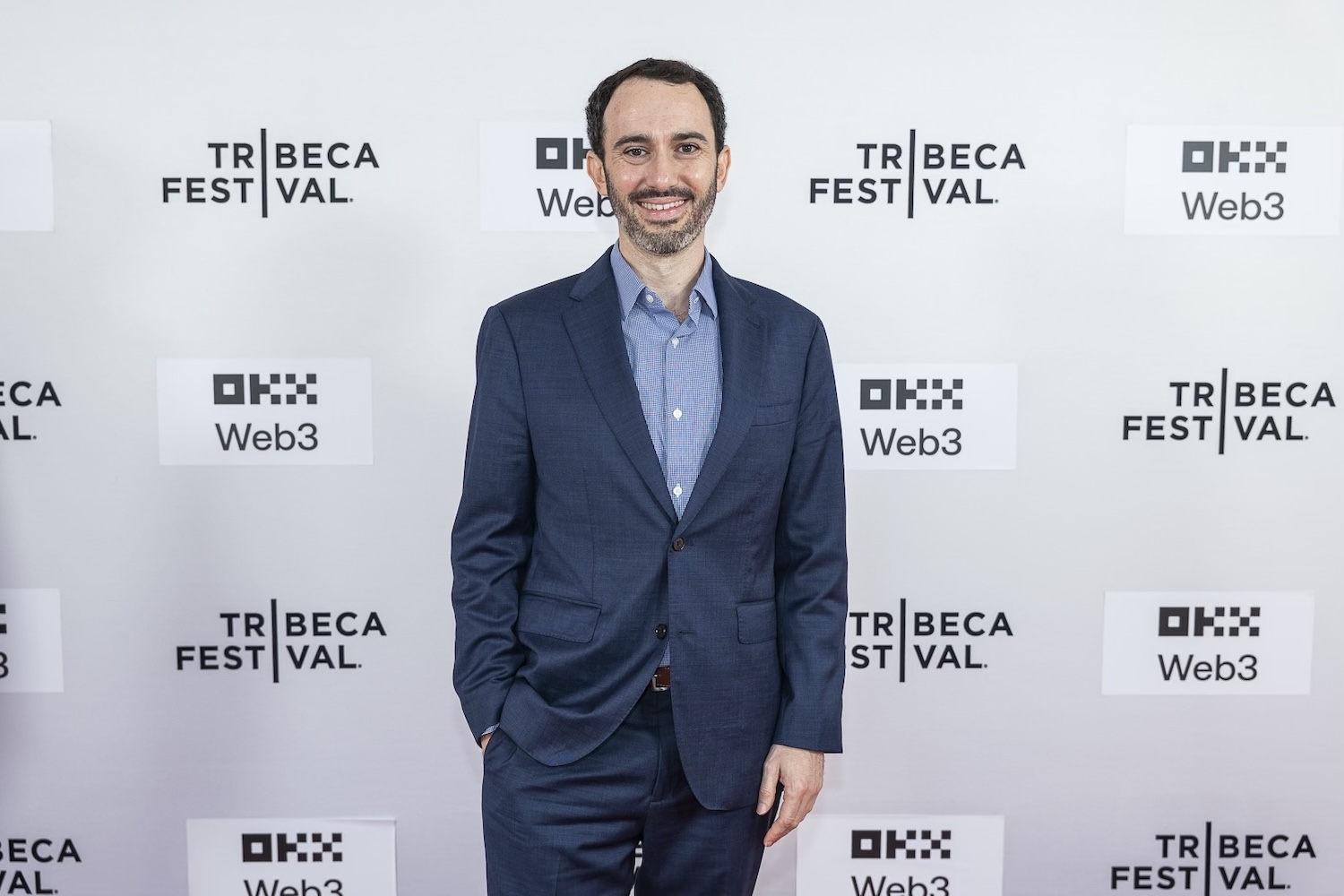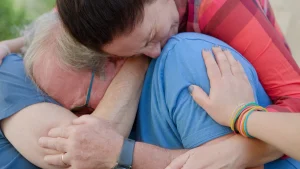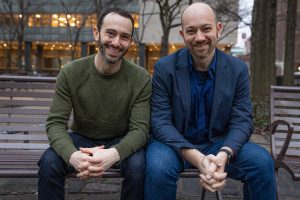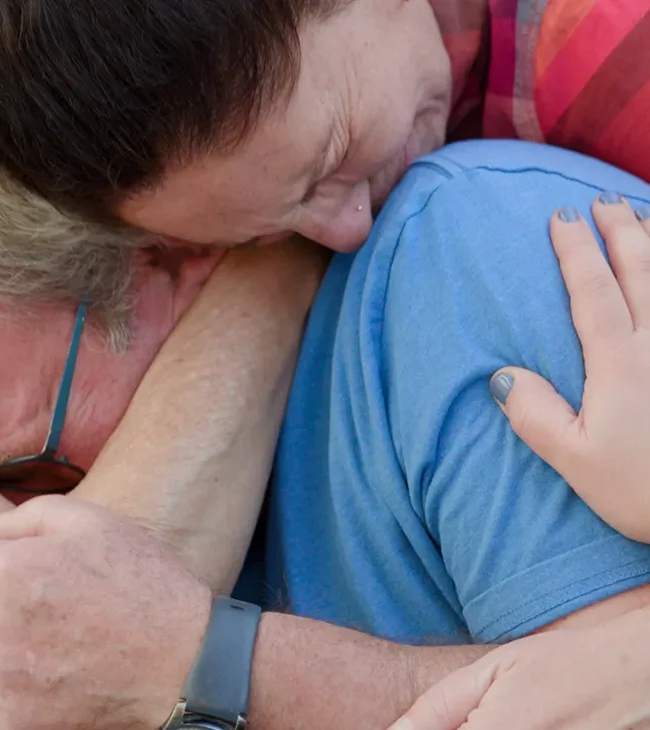A Conversation with Brandon Kramer (HOLDING LIAT)

In his new documentary, Holding Liat, director Brandon Kramer follows an American-Israeli family in the middle of the worst crisis imaginable: the kidnapping of relatives on October 7, 2023, by members of the terrorist organization Hamas. The titular Liat Atzili is the daughter of Yehuda and Chaya Beinin. On that fateful day, she was taken hostage when Kibbutz Nir Oz was overrun. What happened to her husband, Aviv, remains a mystery as the film begins. Kramer and his producer brother Lance are distant cousins of the Beinin-Atzilis, and with the access that this status gives them they create a moving portrait of people navigating . What especially surprises—and gives us hope for humanity—is that Yehuda and Liat’s humanitarian values and progressive politics remain unbowed in the wake of their personal disaster. I reviewed the film during its recent run at Tribeca 2025 (it premiered in February at the 2025 Berlin International Film Festival, or Berlinale, where it won the Documentary Award) and then, just after the fest, interviewed Brandon Kramer via Zoom. What follows is a transcript of that conversation, edited for length and clarity.
Hammer to Nail: Could you please explain your relationship to Yehuda and Chaya?
Brandon Kramer: Yehuda and Chaya are distant cousins of Lance’s and mine, and our first time going to Israel was living on their kibbutz. They were our introduction to Israel, and their daughter Tal lived in Tel Aviv at the time and we spent a week living with her in Tel Aviv. And so they’re distant relatives, but they are our family in Israel. And so a few days after October 7th, when we found out that Liat and Aviv were missing, we naturally called them to check in on them and see if there were any ways that we could be supportive. And in that phone call, a few things became clear.
HtN: When did they emigrate to Israel and decide to live there?
BK: Yehuda is originally from Philadelphia and Chaya grew up in New York and although I can’t remember the exact year, it was the early 1970s. Their parents all emigrated to Israel at slightly different times, but around the same time. And then Yehuda’s brother, Joel, eventually came back to the U.S. for the reasons you see in the film.
HtN: Would you say that the opinions of Yehuda and Chaya are representative of the majority of the relatives of those taken hostage on October 7th, 2023? Or do we see the same range of opinions that we see everywhere in this world about the conflict?
BK: The only families I got to know decently well were the American-Israeli families, and I’ll say every single family has their own completely distinct and unique ways of processing the trauma that they’ve been through and their own political views and their own views on how much politics should be a part of the advocacy for the release of their loved ones. And so when we were making the film early on, we just decided that this is really a story of our relatives and the Beinin-Atzili family. And within that family, itself, there was such a diversity of views and experiences that that’s really what the frame of our film focuses on. But I know from just speaking with the other hostage families extensively that they each have their own distinct views, some of which might be in alignment with the Beinin-Atzilis and some of which may not.
HtN: Understood. So, you were starting to tell me how the idea of this film came about. Let’s return to that: you call them to check on them; what happens next?
BK: I call them to check in on them and in that phone call, a few things started to become clear to Lance and me. We had no intention whatsoever of making a film. When we picked up the phone, Yehuda told us on the call that he was planning to get on a plane with his grandson, Netta, and his other daughter, Tal, to come to the U.S. to advocate for Liat and Aviv’s release because he was not getting a response from the Israeli government. So the first thing that became apparent was he was about to fly and come to our hometown. My brother and I are filmmakers in Washington, DC, so this horrific thing that was happening to our relatives was about to land on our doorstep.

A still from HOLDING LIAT
The other thing that happened on that call is it became clear that Yehuda was speaking about a need to focus on peace and reconciliation. In addition to getting Aviv home, he was explaining to us the different ways members of his family were processing this. And Lance and I very quickly realized that even just in that brief call, what they were going through did not fit into any of the boxes that were being painted in the media or on social media of what the hostage family’s experiences were. It was so much more complex than what was being presented. And because the entire world was focused on the hostages, the consequences of what that narrative was were very significant.
It didn’t just affect how the story was being told about what these families were going through, it didn’t just affect Liat, Aviv, or the other hostages, it also affected millions of Palestinians and Israelis and people across the entire region. And we felt this responsibility as filmmakers who for the past 15 years have been telling stories that really intimately and authentically try to understand human beings caught in the center of really important social and political issues. Here’s our family thrust into the epicenter of one of the biggest international crises of our time—the experience of the hostages, deeply misunderstood in the world, extremely polarized—and we felt a responsibility to try to authentically tell that story and document it as authentically as we could.
HtN: What challenges of access did you face? Obviously, you had access to the family, but when you bring the camera with you to follow them into some of these lobbying efforts of theirs with United States congresspeople and senators, as well as others, were there any issues you had to negotiate in order to get access?
BK: I’ll first just speak to the family because even though I’m a relative of theirs, just being related to somebody doesn’t mean you right off the bat have the trust to document with a camera how a husband and wife have a fight in the middle of the night while they’re not getting news about their daughter coming out of captivity. It was so challenging to get to a place with this whole family where we could document these really internal moments of tension. These are really sensitive spaces, and you have to remember, this wasn’t a normal time. Their loved ones’ lives are at risk. And Yoni Brook—the Director of Photography and producer—and I were literally sleeping on the floor of Yehuda and Chaya’s hotel room so we could document what it looks like for parents to be woken up in the middle of the night by a call from the IDF saying, “Your daughter’s not coming out of captivity today.”
We were living in their home on their kibbutz and I frequently was walking this line of pushing too hard and bringing a camera into incredibly sensitive moments that they weren’t yet ready to have filmed. And then I would have to sort of rebuild trust and get to a better place. I fell on my face constantly that way, or I put the camera down because I just wanted to show up as a cousin, as somebody who loves them, and I missed something really critical. So it was a constant ethical line that I was walking while making the film with the family when it came to meetings with politicians, lobbyists, and different kinds of advocacy groups.
I think the most important thing is that the protagonists of the film believe in the importance of the film. Thankfully, Yehuda, Chaya, Tal and Netta, they … Liat is a history teacher, and from a very early stage they felt that Liat would want … their family was experiencing history and they sort of channeled Liat even though she wasn’t there and said, “I think Liat would want this documented.” And so their belief in the film deeply affected our access to all these other external spaces because they were advocating for us to be in the room. So when they’re meeting with Mitch McConnell or Chris Van Hollen, the family is asking them, “Hey, I know we’re having this conversation. These filmmakers who we’re related to are making this documentary which is really trying to authentically represent our experiences. Can they film the meeting or can they film part of the meeting?” To be honest, you can’t film these kinds of conversations or spaces without the family, who is directly impacted, making the request on our behalf. It’s really, really complicated and tricky.
And last thing I’ll say, about Liat, in particular, it was even more complicated because here’s somebody who is coming out of 54 days in captivity, and is in the hospital. I couldn’t get her consent to film that scene when she’s with her family in advance because she wasn’t here. And so just navigating, “How do I make sure she feels comfortable with us making a film that she just found out about within minutes of her being released from captivity?” That was a whole other set of ethical questions.
HtN: I found it very interesting to hear about her experience in captivity, which ran counter to what one might expect when somebody is kidnapped. From what you’ve learned, would you say that that experience was replicated among other hostages, or was hers unique in that she just happened to be taken by a person with a kind family who wanted to make sure that she was treated this way?
BK: I’ve heard this question asked of her and I think she would say that there are people who had some similarities to her experience and people who had dramatically different and much more horrific experiences in captivity. When she came out, Liat was very open and transparent about the contradictions within her own experience. On the one hand, her husband was murdered and her children were almost killed on October 7th. She had no idea if they lived and she was held against her will for 54 days. These are horrific things that happened to her, and she’s very clear about that. On the other hand, the people who held her, though she was being held against her will, treated her humanely while in captivity. She was well taken care of. They treated her with respect, all things considered.

Brandon and Lance Kramer
And the fact that she has been courageous to share the complexity of that experience for me, as a filmmaker, felt critical to give audiences all of these truths, even if they don’t fit an easy narrative. It leaves you with more questions than answers. But I think in a moment like we’re living in right now where there are multiple wars going on, so much violence, so much destruction, millions of people’s lives at stake, we as the public and we as filmmakers presenting a narrative to the public need to be able to sit with the actual nuances of these narratives so that we can make informed connections and views based on actual lived experiences. And they don’t fit into these simple narratives. They just don’t.
HtN: Unfortunately, nuance is in short supply right now. I appreciate your efforts there. What kind of reactions have you received to your film in your public screenings?
BK: When we finished the film, I can’t tell you how many people came up to Lance and me and said, “There are going to be protests. There’s going to be this, there’s going to be that.” There was so much fear around sharing a story that deals in a complex way about Israel and Palestine. And thus far, the reception has been pretty incredible. And I think it’s largely due to the fact that the film is just so grounded in a very humanistic portrait of a family that has very different opinions. In Berlin, the first person to raise their hand at the Q&A was a man from Lebanon, and in front of 500 people, he said, “I’ve never met an Israeli person in my life, and I came to this film to try to learn, and your family has shown that there’s light in the darkness.”
And then he asked if he could come on stage and hug each one of the four members of the family. And he did that. And the audience applauded this moment of empathy and connection. And so all this fear that had built up to that world premiere and we’re left with a moment of connection. It gives me hope that, yes, we’re extremely divided and yes, this is the third rail of issues, but when you allow people the space to sit with the humanity and complexity of a family’s lived experience, it’s very disarming and allows for a kind of connection that I think can really contribute towards healing and peace.
HtN: That’s a lovely moment and we’ll end there. I’m so glad that everyone had that experience and that you had that experience with the film. So thank you so much, Brandon. I really enjoyed the film and I wish you all good things with it.
BK: Chris, thanks so much. I really appreciate your support and engagement.
– Christopher Llewellyn Reed (@ChrisReedFilm)










